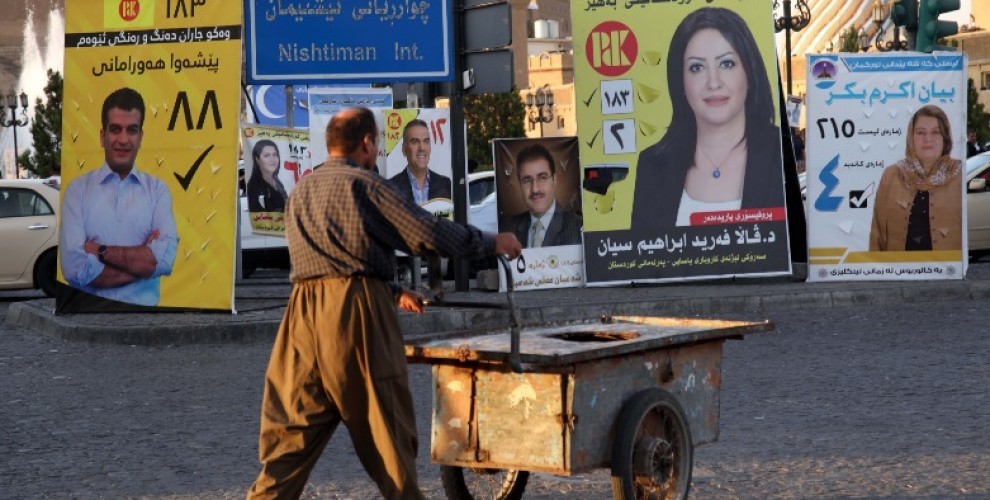Cold feet on the eve of Kurdistan Regional Government elections
No matter who you ask to, the answer is always the same: “Nothing will change. The elections are on Sunday but the results are already known and the ‘winner’ is already celebrating”.
No matter who you ask to, the answer is always the same: “Nothing will change. The elections are on Sunday but the results are already known and the ‘winner’ is already celebrating”.

The elections are those taking place tomorrow, Sunday, in the Kurdistan Regional Government. Indeed today’s media already run articles saying that the KDP (Kurdistan Democratic Party, led by old leader Masoud Barzani) is on the lead.
On Friday, in fact, long queues of cars and minivan filled the roads of the Kurdistan Region, not because of the holiday day, but because Asayish (security), Peshmerga and police in the four votes could exercise their right to vote.
Some 99 polling centers were opened so to ensure maximum security on Sunday. The High Electoral and Referendum Commission (IHERC) reported that 156,314 out of some 170,000 security force members actually had cast their vote.
We run along the Duhok-Sulaymaniyah road and indeed the traffic was heavy with vans loaded with the Kurdish militias returning to their home towns and cities to cast their vote.
Along the road, a lot of propaganda posters, showing the smiling faces of the candidates from the various parties but also historical pictures, recalling the past of old leaders and fighters. Depending on the areas the poster change. In the KDP strongholds posters of Masoud Barzani, but also of old peshmerga commanders, while in the PUK-controlled areas giant photos of late leader Jalal Talabani (who passed away last year) dominate road checkpoints and the entrance to Sulaymaniyah.
The KDP is expected to ‘win’ these elections, and indeed the papers this morning were already giving the party of current Prime Minister, Nechirvan Barzani, on the lead.
The last few weeks have been marked by the KDP stirring up tensions when some of his prominent members hinted that if the party wins the majority of votes on Sunday it could leave aside the twenty years old power-sharing On September 23, just a week before the vote, Masoud Barzani visited (a rare event) Sulaymaniyah, the "capital" of the PUK, and held a rally there. He told the crowd: "Whoever agrees with us, we would agree and share a home with them. But those who are against this doctrine and goal, it's difficult for them and us to be united and share a home." with the PUK.
The High Board of Elections had given the parties just three weeks to run their electoral campaign, adding fuel on the fire of those saying that in fact the contest was a mere show, because everything had already been decided, beginning with the outcome.
The electoral campaign seemed not coincidentally quite a bit undertone, although the main parties held rallies in some important centres. On Thursday, Gorran and PUK held their final rallies in Sulaymaniyah. While the KDP obviously chose Hewler (Erbil) to close its campaign.
After the numerous protests and accusations of fraud at the May 12 Iraqi national elections, the IHERC took a number of measures in order to prevent frauds and irregularities, the first being that all ballots will be counted manually.
Another measure allow the commission to take close-up photos of all voters, so to allow a quick identification should anyone complain or make claims of fraud.
Voters, Candidates, Seats
On Sunday, 773 candidates from 29 political parties will try to gain a seat in the 111-seat parliament in the semi-autonomous region. Some 5,941 voting centers have been established.
A total of 3,085,461 voters are registered: 39% from Sulaymaniyah Province, 36% from Erbil, 23% from Duhok, and around 2% from the newly established Halabja Province.
Background
At the last Parliamentary Elections held in the Kurdistan Region, on 21 September 2013, it was the first time since 1992 that the KDP and PUK were running as individual parties and also the first time that a new party, Movement for Change (Gorran), challenged the two party rule.
The KDP won 38 seats, Gorran won 24 and the PUK won 18 for a total of 80. The Islamic Parties won 17 seats, while left wing parties only got 3 seats, five seats each were reserved for Turkmen and Assyrian candidates and one for an Armenian candidates.
As for gender, out of a total of 111 seats, 77 were won by men and 34 by women.
56 seats were needed for a majority and the right to form a government, but no single party reached that number.
A coalition government was thus formed with Nechirvan Barzani as Prime Minister (KDP), Qubad Talabani as Deputy Prime Minister (PUK) and Yousif Muhammed as Speaker of Parliament (Gorran).